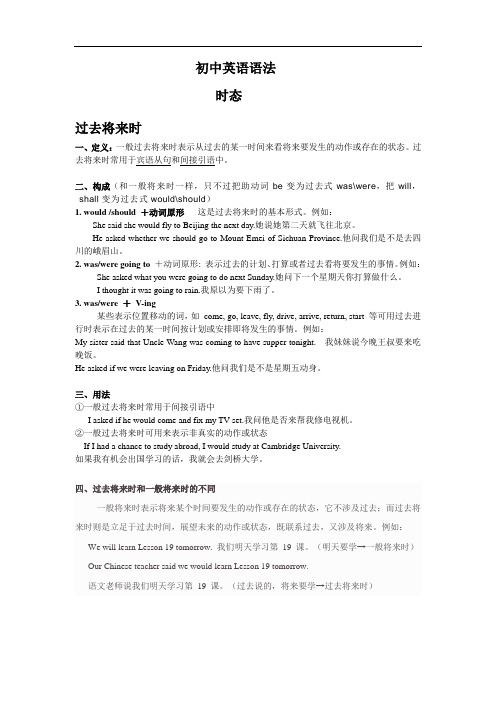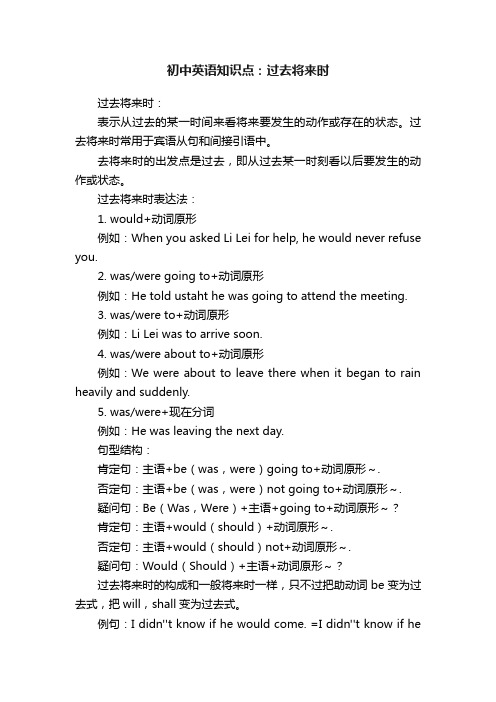初中英语语法:过去将来时
(优质)过去将来时的结构及用法

过去将来时的结构及用法过去将来时指的就是一般过去将来时,表示从过去的某一时间来看将来要发生的动作或呈现的状态。
在英语时态中,“时“指动作发生的时间,”态“指动作的样子和状态。
一般过去将来时的出发点是过去,即从过去某一时刻看以后要发生的动作或状态。
过去将来时由would,was/were going to,was/were to,was/were about to等加动词原形构成,也可由was/were on the point of加动名词构成。
过去将来时的构成肯定句:(1)主语+be(was或were)going to+动词原形(v.原)+其它;(2)主语+would+动词原形+其它;(3)was/were+动词不定式;否定句:(1)主语+be not(wasn‘t或weren’t)going to+动词原形+其他;(2)主语+would not+动词原形+其它;疑问句:(1)Be(Was或Were)+主语+going to+动词原形+其它;(2)Would+主语+动词原形+其它;被动语态:(1)would+be+动词的过去分词(done);(2)was/were+going to be+动词的过去分词.(done)。
用法如下一、"would+动词原形"表示过去将来时,"would+动词原形"构成过去将来时,常表示根据计划或安排即将发生的事。
例:He said he would come to see me.他说他要来看我。
二、"was/were+going to+动词原形"表示过去将来时,"was/were+going to+动词原形"也可表示根据计划或安排即将发生的事。
例:She said she was going to start at once.她说她将立即出发。
三、某些动词的过去进行时可表示过去将来时,come,go,leave,arrive,start等严格按照时间表发生的表起止的动词可用过去进行时代替过去将来时。
英 语语法 过去将来时及初中时态归纳

初中英语语法时态过去将来时一、定义:一般过去将来时表示从过去的某一时间来看将来要发生的动作或存在的状态。
过去将来时常用于宾语从句和间接引语中。
二、构成(和一般将来时一样,只不过把助动词be变为过去式was\were,把will,shall变为过去式would\should)1. would /should +动词原形这是过去将来时的基本形式。
例如:She said she would fly to Beijing the next day.她说她第二天就飞往北京。
He asked whether we should go to Mount Emei of Sichuan Province.他问我们是不是去四川的峨眉山。
2. was/were going to+动词原形: 表示过去的计划、打算或者过去看将要发生的事情。
例如:She asked what you were going to do next Sunday.她问下一个星期天你打算做什么。
I thought it was going to rain.我原以为要下雨了。
3. was/were +V-ing某些表示位置移动的词,如come, go, leave, fly, drive, arrive, return, start 等可用过去进行时表示在过去的某一时间按计划或安排即将发生的事情。
例如:My sister said that Uncle Wang was coming to have supper tonight. 我妹妹说今晚王叔要来吃晚饭。
He asked if we were leaving on Friday.他问我们是不是星期五动身。
三、用法①一般过去将来时常用于间接引语中I asked if he would come and fix my TV set.我问他是否来帮我修电视机。
②一般过去将来时可用来表示非真实的动作或状态If I had a chance to study abroad, I would study at Cambridge University.如果我有机会出国学习的话,我就会去剑桥大学。
过去将来时

过去将来时的构成
1.肯定句: 主语+would(should)+动词原形+其他
2.否定句: 主语+would(should)not+动词原形 +其他
3.疑问句: Would(Should)+主语+动词原形+其他
4.特殊疑问句: Wh-+would(should)+主语+动词原形+其 他
5.肯定句:主语+was/were going to+动词原 形+其他
两天后, 三周后, 四年后
two days /three weeks/ four years later
用法1
1. 和表示过去将来时间状语连用,多见于从句,特别是 宾语从句中(当主句是过去时,宾语从句表示将要发生 的事,用过去将来时)
He said he_w_o_u_l_d_r_e_t_u_rnto the hometown the next day. We never imagined he_______ a doctor in the future.
• 她66岁了。三年后,她是69岁。 •InSthhreeewayseasrisx,tys-hseixw. _a_s_g_o_i_n_g_t_o_/_w_o_u_l_d_b_e__6_9. years old 科学家说没有人知道一百年之后将会发生什么事。
•ScSiecnietinsttistssasidaindo_b_o_d_y__k_n_e_w__w_h_a_t_w__o_u_ld. happen in one hundred years’ time. 老师问汤姆长大后准备干什么. •ThTehteeatecahcehrearsaksekdewdhTaotmTo_m__w__a_s_g_o_i_n_g__to_/_would do when he grew up.
初中英语知识点:过去将来时

初中英语知识点:过去将来时过去将来时:表示从过去的某一时间来看将来要发生的动作或存在的状态。
过去将来时常用于宾语从句和间接引语中。
去将来时的出发点是过去,即从过去某一时刻看以后要发生的动作或状态。
过去将来时表达法:1. would+动词原形例如:When you asked Li Lei for help, he would never refuse you.2. was/were going to+动词原形例如:He told ustaht he was going to attend the meeting.3. was/were to+动词原形例如:Li Lei was to arrive soon.4. was/were about to+动词原形例如:We were about to leave there when it began to rain heavily and suddenly.5. was/were+现在分词例如:He was leaving the next day.句型结构:肯定句:主语+be(was,were)going to+动词原形~.否定句:主语+be(was,were)not going to+动词原形~.疑问句:Be(Was,Were)+主语+going to+动词原形~?肯定句:主语+would(should)+动词原形~.否定句:主语+would(should)not+动词原形~.疑问句:Would(Should)+主语+动词原形~?过去将来时的构成和一般将来时一样,只不过把助动词be变为过去式,把will,shall变为过去式。
例句:I didn''t know if he would come. =I didn''t know if hewas going to come. 我不知道他是否会来。
过去将来时具体用法:一、would+不定式1.用“would+不定式”表示过去将来时间通常带有表示过去将来的时间状语,而且多见于从属分句。
初中英语时态知识点:过去将来时的标志词

初中英语时态知识点:过去将来时的标志词一、would+动词原形表示过去将来时would+动词原形构成过去将来时,常表示根据计划或安排即将发生的事。
例1:He said he would come to see me.他说他要来看我。
例2:He told me he would go to Beijing.他告诉我他将去北京。
二、was /were+going to+动词原形表示过去将来时was /were+going to+动词原形也可表示根据计划或安排即将发生的事。
例1:She said she was going to start at once.她说她将立即出发。
例2:I was told that he was going to return home.有人告诉我他准备回家。
was /were+going to+动词原形还可表示根据当时情况判断有可能但不一定会发生某事。
例:It seemed as if it was going to rain.看来好像要下雨。
三、某些动词的过去进行时可表示过去将来时come,go,leave,arrive,start 等严格按照时间表发生的表起止的动词可用过去进行时代替过去将来时。
例1:He said the train was leaving at six the next morning.他说火车第二天早晨出发。
例2:She told me she was coming to see me.她告诉我她要来看我。
四、特定场合的一般过去时可表示过去将来时条件状语从句和时间状语从句中须用一般过去时代替过去将来时。
例1:I didn't know when she would come, but when she came Iwould let you know.我不知道她什幺时候来,但她来了我会告诉你。
析:第一个when 引导宾语从句,可使用将来时,第二个when 引导时间状语从句,只能用一般过去时代替过去将来时。
初中英语语法课件-过去将来时

时态一致性 在条件状语从句和时间状语从句中,如果主句描述
的是过去的情况,那么从句中原本应该使用一般将来 时的动作,需要改为过去将来时,以保持一致的时态。 If it didn’t rain, we would go for a walk. 如果不下雨,我们就会去散步。
表示从过去某一时间来看将要发生的动作或存在的状 态, 常用于宾语从句中。 He said there would be a concert that evening. 他说晚上将有一场音乐会。
初中英语语法课件
过去将来时
过去将来时表示在过去 某个时间点看来将要发 生的动作,常用在间接 引语或者宾语从句中。
a. 过去将来时由“ should/ would+动词原形”构成 b. 第1人称 I、 we在句中作主语时, 可以 用 should 或 would c.其他人称在句中作主语时, 都用 would
practice
Practice
1.Li Ming said he _____ happy if Brian _____ to China next month. A. as; come B. was; would come C. would be; came D. will be; come
Practiபைடு நூலகம்e
(4) was/were about to + 动词原形型
这种方式强调动作发生的紧迫性,即某个动作在说话人 提及的那一刻即将发生,但尚未发生。 We were about to leave when the phone rang. 我们正要离开,这时电话响了。
(5) 过去进行时(was/were + 现在分词)型
表示过去习惯性的动作。 Every evening he would go and talk with the workers. 每天晚上他都和工人交谈。
英语必考时态结构之过去将来时
英语必考时态结构之过去将来时一般过去将来时表示从过去的某一时间来看将来要发生的动作或呈现的状态。
在英语时态中,“时“指动作发生的时间,”态“指动作的样子和状态。
一般过去将来时的出发点是过去,即从过去某一时刻看以后要发生的动作或状态。
下面是小编为您收集整理的英语必考时态结构之过去将来时,供大家参考!英语必考时态结构之过去将来时1. 概念:立足于过去某一时刻,从过去看将来,常用于宾语从句中。
2. 时间状语:the next day(morning, year),the following month(week),etc.3. 基本结构:①was/were/going to + do;②would + do.否定形式:①was/were/not + going to + do;②would + not + do.一般疑问句:①was或were放于句首;②would 提到句首。
4. 用法1) “would+动词原形”常表示主观意愿的将来。
例如:He said he would come to see me.他说他要来看我。
He told me he would go to Beijing.他告诉我他将去北京。
2) “was/ were+going to+动词原形”常表示按计划或安排即将发生的事。
例如:She said she was going to start off at once.她说她将立即出发。
I was told that he was going to return home.有人告诉我他准备回家。
此结构还可表示根据某种迹象来看,很可能或即将发生的事情。
例如:It seemed as if it was going to rain.看来好像要下雨。
3) come, go, leave, arrive, start等瞬时动词动词可用过去进行时表示过去将来的含义。
例如:He said the train was leaving at six the next morning.他说火车将于第二天早晨六点离开。
过去将来时概念
过去将来时概念过去将来时1.定义:过去将来时即一般过去将来时(一般过去将来时)。
一般过去将来时表示从过去的某一时间来看将来要发生的动作或存在的状态。
过去将来时常用于宾语从句和间接引语中。
一般过去将来时的出发点是过去,即从过去某一时刻看以后要发生的动作或状态。
2.结构:肯定句:主语+be(was,were)going to+动词原形主语+would(should would)+动词原形否定句:主语+be not(wasn‘t,XXX)+动词原形+其它主语+would(should或could)not+动词原形+其它疑问句:Be(Was,Were)+主语+going to+动词原形+其它Would(Should could)+主语+动词原形+其它1.同一般将来时不一样,把系动词be变为过去式,把will,shall变为过去式。
例句:I didn't know if he would come.I didn't know if he was going to come.我不知道他是否会来。
She was sixty-six。
In three years,she would be sixty-nine.她66岁了。
三年后,她是69岁。
She told us that she would not go with us,if it rained.她告诉我们,如果下雨,她就不和我们一起去了。
I didn't know how to do it。
What would be their ideas?我不知如何去做,他们会有什么想法呢?2.过去将来时常可用来表示过去惯性的动作。
此时,不管什么人称,一律用would。
过去将来时有时可带时间状语注意1"was/were going to +动词原形"或"was/were +动词不定式完成式"可表示未能实现的过去将来时间的动作。
过去将来时的句子
过去将来时的句子过去将来时是英语语法中的一个时态,用来表示过去某个时间点之前发生的将来的动作或状态。
在过去将来时中,主要使用 would 或 was/were going to 来表示将来的动作或状态。
下面我们来详细了解一下过去将来时的构成和用法。
过去将来时的构成。
过去将来时的构成非常简单,主要是通过 would 或 was/were going to 加上动词原形来表示。
具体构成如下:肯定句,主语 + would/was/were going to + 动词原形。
否定句,主语 + would/was/were not + 动词原形。
疑问句,Would/Was/Were + 主语 + 动词原形 + 其他?过去将来时的用法。
1. 表示过去某个时间点之前将要发生的动作或状态。
例如,He said he would come to see me tomorrow.(他说他明天会来看我。
)。
2. 表示过去某个时间点之前的打算、计划或意图。
例如,She was going to tell him the truth, but she changed her mind.(她本来打算告诉他真相,但她改变了主意。
)。
3. 表示过去某个时间点之前的习惯性动作。
例如,Every morning, he would go for a run in the park.(每天早上,他都会去公园跑步。
)。
4. 用于虚拟条件句中,表示与过去事实相反的假设。
例如,If I had known, I would have helped you.(如果我知道了,我会帮助你的。
)。
过去将来时与其他时态的区别。
过去将来时与其他时态的区别在于它表示的是过去某个时间点之前将要发生的动作或状态,而不是当前或将来的动作或状态。
因此,需要根据上下文来确定使用过去将来时还是其他时态。
总结。
过去将来时是英语语法中的一个时态,用来表示过去某个时间点之前将要发生的动作或状态。
【初中英语】常见过去将来时最全总结精品资料
【初中英语】常见过去将来时最全总结精品资料一、初中英语过去将来时1.Mr. Wang said he ______ us ______ for another two weeks.A. will allow; to workB. will allow; workC. would allow; to workD. has allowed; work 【答案】 C【解析】【分析】句意:王先生说他将允许我们再工作两周。
根据句子结构可知,这是含有宾语从句的主从复合句,主句的谓语动词是said,是过去时,故从句也要用过去的某种时态;从句的时间状语是for another two weeks,又两周,所以从句是将来时,故用过去将来时,所以第一个空填would allow;另外第二个空allow sb. to do sth.允许某人做某事,固定短语,故选C。
【点评】此题考查宾语从句和固定短语。
注意从句的时态和allow sb. to do sth.固定短语。
2.I didn't know when he _____ back. He said he would call me when he _____ home.A. would come, gotB. came, gotC. will come, getsD. came, would get【答案】 B【解析】【分析】句意为:我不知道他什么时候回来。
他说他一回来就给我打电话。
前句是when引导的宾语从句,根据语境应用一般过去时。
后句是when引导的时间状语从句,主句用过去将来时,从句用一般过去时。
故选B。
【点评】考查从句的时态。
3.Who would you ___________ as your best friend?A. chooseB. to chooseC. choseD. choosing【答案】 A【解析】【分析】句意:你会选择谁作为你最好的朋友。
- 1、下载文档前请自行甄别文档内容的完整性,平台不提供额外的编辑、内容补充、找答案等附加服务。
- 2、"仅部分预览"的文档,不可在线预览部分如存在完整性等问题,可反馈申请退款(可完整预览的文档不适用该条件!)。
- 3、如文档侵犯您的权益,请联系客服反馈,我们会尽快为您处理(人工客服工作时间:9:00-18:30)。
初中英语语法:过去将来时
导读:本文初中英语语法:过去将来时,仅供参考,如果觉得很不错,欢迎点评和分享。
一、过去将来时的含义
过去将来时表示在过去某个时间看来将要发生的动作或存在的状态。
过去将来时常用于宾语从句和间接引语中。
例如:I didn‘t know if he would come.我不知道他是否会来。
They never knew that population would become a big problem.他们从来都不知道人口问题将会成为一个大问题。
推荐信息
英语四级写作句型六大成分英语的句子
四级写作必备句型直接引语转换间接引语
四级写作书信写作常用句零冠词的讲解
英语四级写作好句定冠词讲解及口诀
She didn‘t tell me where she would go.她没有告诉我她要去哪儿。
Betty said she would visit the Great Wall next Saturday.贝蒂说下周六她要去参观长城。
二、过去将来时的表达法
(一)“would+动词原形”。
常表示按计划或安排即将发生的事。
例如He said he would come to see me.他说他要来看我。
He told me he would go to Beijing.他告诉我他将去北京。
(二)“was/ were+going to+动词原形”。
常可用来表示按计划或安排即将发生的事。
例如:She said she was going to start off at once.她说她将立即出发。
I was told that he was going to return home.有人告诉我他准备回家。
此结构还可表示根据当时情况判断有可能但不一定会发生某事。
例如:It seemed as if it was going to rain.看来好像要下雨。
(三)come,go,leave,arrive,start等动词可用过去进行时代替过去将来时。
例如:He said the train was leaving at six the next morning.他说火车将于第二天早晨六点离开。
She told me she was coming to see me.她告诉我她要来看我。
(四)条件状语从句和时间状语从句中须用一般过去时代替过去将来时。
例如:I didn‘t know when she would come,but when she came I would let you know.我不知道她什么时候来,但她来了我会告诉你。
The teacher said that it would be very difficult to make progress if I didn‘t work hard.老师说,如果我不努力学习的话,就很难取得进步。
专项练习:
1. - The plane is leaving right now,but Jim hasn't arrived yet.
- Well, he said he _____here on time.
A came
B would come
C can be
D will be
2 As soon as the baby saw her mother, she _____.
A was going to cry
B cryed
C began to cry
D was crying
3 Li Ming said he _____happy if Brian_____to China next month.
A as; come
B was; would come
C would be; came
D will be; come
4Jenny said she _____her holiday in China.
A spent
B would spent
C was going to spent
D would spend
答案:1 B 2 C 3C 4 D。
